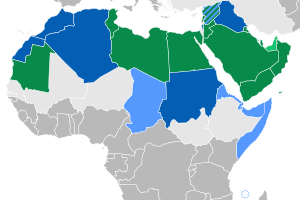Arabic language facts for kids
Quick facts for kids Arabic |
||||
|---|---|---|---|---|
| العربية al-ʻarabiyyah | ||||

al-ʿArabiyyah in written Arabic (Naskh script)
|
||||
| Native to | Majorities in the countries of the Arab League, minorities in neighboring countries: Israel, Iran, Turkey, Eritrea, Mali, Niger, Chad, Senegal, South Sudan, Ethiopia, Arabic-speaking communities in the Western world | |||
| Native speakers | 295 million (2010) | |||
| Language family |
Afro-Asiatic
|
|||
| Standard forms |
Modern Standard Arabic
|
|||
| Dialects |
Western (Maghrebi)
Central (incl. Egyptian, Sudanese)
Northern (incl. Levantine, Iraqi)
Southern (incl. Gulf, Hejazi)
|
|||
| Writing system | Arabic alphabet Arabic Braille Syriac alphabet (Garshuni) Hebrew alphabet (Judaeo-Arabic) |
|||
| Official status | ||||
| Official language in | Standard Arabic is an official language of 27 states, the third most after English and French | |||

Use of Arabic as the sole official language (green) and an official language (blue)
|
||||
|
||||
Arabic (العربية) is a language spoken by many people around the world. It belongs to the Semitic language family, just like Hebrew. About 295 million people speak Arabic as their first language. Many more people can understand it too.
Arabic is written using the Arabic alphabet. Unlike English, it is written from right to left. Because so many people speak Arabic, it is one of the six official languages of the UN. The other official languages are English, Spanish, French, Russian, and Chinese.
Contents
What is Modern Standard Arabic?
Arabic is spoken in many countries, but not everyone speaks it exactly the same way. There are many different dialects (or versions) of Arabic. For example, there's Egyptian Arabic, Gulf Arabic, and Levantine Arabic. Some of these dialects are quite different, so speakers might find it hard to understand each other.
To help people from different regions communicate, there is something called Modern Standard Arabic (MSA). This is the formal version of the language. It is used in books, newspapers, TV news, and official documents. It helps keep the language connected across all Arabic-speaking countries.
Where is Arabic Spoken?
Most countries where Arabic is an official language are in the Middle East and North Africa. This area is often called the Arab World. Arabic is an official language in 27 countries, making it the third most common official language after English and French.
Here are some of the countries where Arabic is an official language:
- Algeria
- Bahrain
- Comoros
- Chad
- Djibouti
- Egypt
- Eritrea
- Iraq
- Israel
- Jordan
- Kuwait
- Lebanon
- Libya
- Mauritania
- Morocco
- Oman
- Palestine
- Qatar
- Western Sahara
- Saudi Arabia
- Sudan
- Syria
- Tunisia
- United Arab Emirates
- Yemen
Arabic is also a national language in:
Why is Arabic Important?
Arabic is very important in the religion of Islam. Muslims believe that Allah (God) spoke to the prophet Muhammad through the Archangel Gabriel. This message became the Quran, which is written in Arabic. Because of this, many Arabic speakers are Muslims, but not all are.
Learning Arabic is becoming more popular around the world. Even though Arabic grammar can be tricky for people who speak languages like English, many words from Arabic have been borrowed into other languages. This is because Arabic has played a big role in history.
Can you guess some English words that come from Arabic? Here are a few:
Images for kids
-
Arabic calligraphy written by a Malay Muslim in Malaysia. The calligrapher is making a rough draft.
See also
 In Spanish: Idioma árabe para niños
In Spanish: Idioma árabe para niños






